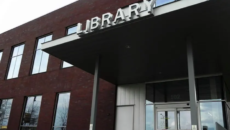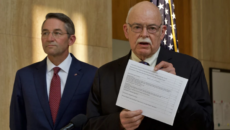Legislature Considering Study To Wean State Off Federal Education Dollars

Last Thursday, Senate Concurrent Resolution 4012 was introduced by Senators Howard Anderson Jr., Ron Carlisle, Ralph Kilzer, and Margaret Sitte; and Representatives Vernon Laning and David Rust which would, if passed, direct:
… Legislative Management to study state alternatives to the statutory and regulatory requirements placed on North Dakota schools and school districts by the United States Department of Education, determine whether there are viable options to achieve the federal government’s goals without having the federal government’s oversight and involvement, and determine whether the federal fiscal impact is a significant and necessary factor in assenting to the continuance of federal government involvement in this state’s educational process.
A full copy of SCR 4012 can be seen below. A review of the language of this SCR reads more like a laundry list of the US Department of Education’s failures since they were elevated to cabinet status by President Jimmy Carter in 1980 than legislation. More importantly, if passed, it signals the start of a refreshing attitude change on the part of our state legislators.
For too long, they have been too willing to look past what can only be eloquently termed ridiculous federal policies and requirements in order to access “free” federal money. I’ve been told by those “in the know” that the unofficial rule for many years in the legislature is to spend or go after federal funds, regardless of if the rules will allow North Dakota to fully solve the problems, before a dime of state money will be considered.
It has become painfully clear that those federal policies — and the money that fueled them — have done very little to improve the education our children receive, nor make them ready for post-secondary education endeavors (all one needs to do is look at the horrible graduation rate in our own university system) or the workforce as a whole. A lot of that can probably be traced back to the efforts our educators have had to put in to prove they are complying with federal mandates versus teaching our kids.
I honestly don’t think this SCR goes far enough. Education is not the only area where our state government has swallowed the hook of asinine federal rules in order to have a taste of the bait of free federal money. Transportation and disaster relief funding are other areas that come to mind, and I am sure if you surveyed the program managers in other state and local agencies, you would find a lot of their time and efforts are spent ensuring compliance with federal rules instead of serving the taxpayer. We have allowed ourselves to become beholden to the desires of bureaucrats in the beltway, contributed to a ballooning federal debt in the quest to get “our share” of the federal pie, and worst of all — have given up our sovereignty little by little over a long period of time because of it.
A lot of discussion has gone on about what to do with our state surplus. Everyone has a pet spending project, program, or idea they think should become the beneficiary of this windfall. But in reality, what we perhaps should be doing with it (other than maybe giving it back to those who paid the taxes generating the surplus in the first place) is wean ourselves off the flow of federal money, and free ourselves from the federal rules that have come with it. It is also, quite honestly, the responsible thing for us to do as well. If we can take care of ourselves and our own needs with our own resources, we should be doing just that.
North Dakotans know what is best for North Dakota. SCR 4012 is a start towards allowing us to address our needs in ways that will work best for our state, with less interference from DC. I only hope other areas of government services are added to it (or become the subject of their own studies) and the concurrent resolutions are passed. We need to take an honest look at how badly we really need the interference of the federal government in our state, in exchange for a few dollars which we could probably finance from within.







